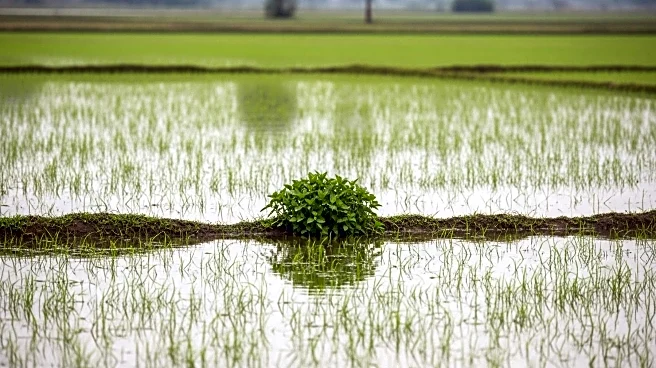What's Happening?
The Food and Agriculture Organisation (FAO) has issued a warning regarding the impact of recent floods in Punjab and Khyber-Pakhtunkhwa on upcoming Rabi cultivation. The floods have inundated 1.3 million hectares, including 0.93 million hectares of cropland, with Punjab being the worst affected. The FAO's preliminary assessment report highlights the threat to seed availability for Rabi 2025-26 and Kharif 2026, as much of the saved grain used for wheat seed was lost in flooded homesteads. Additionally, the floods have caused fodder shortages and increased disease risks for livestock, with conditions favorable for outbreaks of lumpy skin disease, foot-and-mouth disease, and other zoonotic infections. The Punjab Provincial Disaster Management Authority has directed survey teams to prioritize public complaints while assessing losses in affected areas.
Why It's Important?
The floods in Punjab and Khyber-Pakhtunkhwa pose significant challenges to agricultural productivity and food security in the region. The damage to cropland and the threat to seed availability could lead to reduced crop yields and increased prices, affecting farmers' livelihoods and the broader economy. The situation also highlights the vulnerability of agricultural systems to extreme weather events, exacerbated by climate change. The potential outbreaks of livestock diseases further threaten food supply chains and rural communities' economic stability. Addressing these challenges requires coordinated efforts to improve disaster preparedness, enhance agricultural resilience, and implement sustainable farming practices.
What's Next?
In response to the floods, authorities are likely to focus on immediate relief efforts, including providing aid to affected farmers and addressing fodder shortages. Long-term strategies may involve investing in infrastructure to mitigate flood risks and developing policies to support sustainable agriculture and climate adaptation. The FAO's warning may prompt increased attention to seed preservation and distribution to ensure future crop production. Collaboration between government agencies, international organizations, and local communities will be crucial in implementing effective solutions and preventing similar disasters in the future.
Beyond the Headlines
The floods in Punjab and Khyber-Pakhtunkhwa underscore the ethical and environmental challenges of climate change and its impact on vulnerable populations. The situation raises questions about global equity and the responsibility of developed nations to support climate adaptation efforts in less developed regions. Additionally, the cultural and social dimensions of disaster recovery, including the preservation of community ties and traditional practices, are essential considerations in rebuilding efforts. The situation may also prompt a reevaluation of international climate policies and commitments, emphasizing the need for urgent and collective action.









